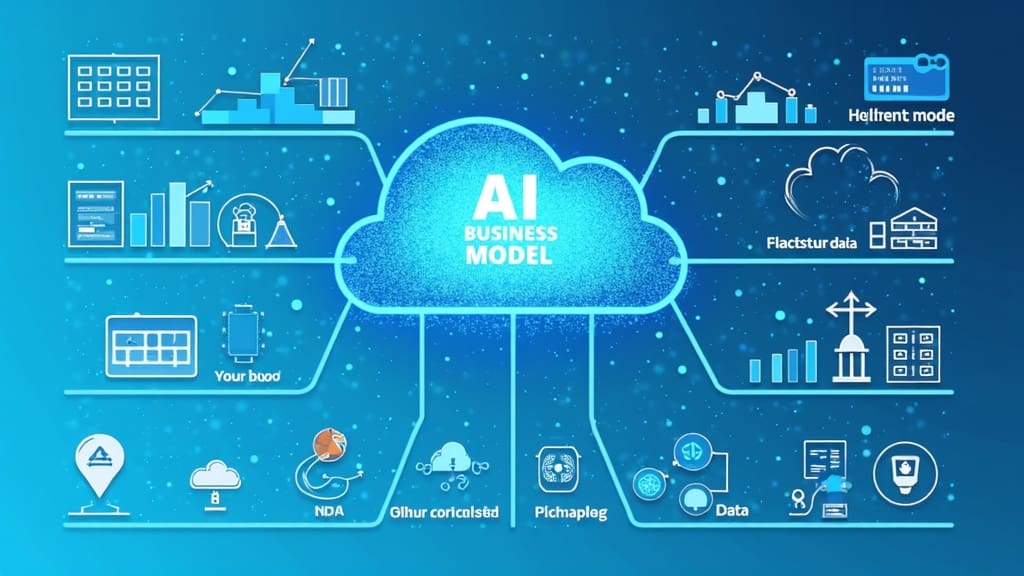If you’re a software developer or tech professional looking at the new AI revolution and thinking about profit, I get it. The world of software business has changed a lot, thanks to AI’s insane pace of innovation. It’s not just about building another SaaS tool or chasing the latest app trend anymore. There are now several ways to carve out a profitable future with AI, some of which are totally new and pretty exciting, especially if you want financial freedom and flexibility without burning out.

Getting Started with an AI-Focused Software Business
Anyone with a background in tech has a solid head start in launching an AI-powered business. But figuring out where to begin can throw up some questions, especially since there are so many new models on the table. It helps to look at a few fundamentals first before getting into the specific business models.
The basics are still important: understanding the pain points you want to solve, working out your target audience, and staying realistic about your resources and available time. But with AI, you don’t need a huge team or years of product development. You need to pick the right model and the right strategy.
The current AI wave is opening up low-barrier, high-upside paths for tech professionals. I’m seeing more people keeping their day jobs, launching AI side businesses, and getting to profit quickly by following a focused framework (like the 12-week system I use with my clients).
Types of Profitable AI Software Business Models
Over the past year, about nine distinct models have emerged for generating a solid profit in the AI space. Here’s a quick overview so you can spot which ones fit your skills and goals:
- AI Consulting
- AI Auditing & Evaluation
- NoCode AI Business
- AI Human Process Implementation
- AI “X as a Service”
- AI-Enabledemerged for generating Marketplaces
- HumanAI Collaboration Tools
- Specialized AI Content & Media
- AI Custom Integrations
Each model comes with its own opportunity space and skill requirements, so it’s worth looking at what each one involves. You may also find that blending multiple options gives you a leg up, allowing for more adaptable income streams.
Guide to the Top AI Business Models for Tech Professionals
Getting your AI software business off the ground is way easier when you understand the real-world models people are using today to hit profitability, sometimes in just weeks, not years. Here’s a breakdown you’ll find pretty handy:
- AI Consulting: If you’re the kind of developer who loves untangling tough challenges, AI consulting is a great fit. This model is all about helping other businesses identify areas for AI adoption, designing tailored solutions, and providing ongoing advice. You don’t need to build products; you sell your time, expertise, and guidance. Many small and medium-sized businesses are desperate for real-world AI answers right now, but have no clue where to start.
- AI Auditing & Evaluation: Trust and transparency are super important as companies adopt AI. Auditing involves reviewing existing AI systems or algorithms for bias, fairness, efficiency, or compliance. There’s a growing demand for experts who can offer third-party evaluation and risk assessment, especially in sectors like finance, healthcare, and law.
- NoCode AI Business: NoCode and low-code platforms enable the creation of AI-powered applications or automations with minimal to no traditional coding.
- AI Human Process Implementation: Some companies want a proper human-in-the-loop solution. You use AI to handle the heavy lifting, data processing, content generation, reports, but keep humans involved in oversight, approval, or custom tasks. This means you can offer hybrid services that blend speed with reliability for clients in regulated industries.
- AI “X as a Service”: This isn’t just SaaS anymore. You can package vertical-specific AI solutions (“AI for dental offices,” “AI for HR onboarding,” or even “AI for local real estate”) and sell them as a recurring subscription. Thanks to APIs from OpenAI, Google, and others, you can develop niche tools without building raw AI models from scratch.
- AI-Enabledjudgmentudgmentjudgment
- HumanAI Collaboration Tools: Sometimes the magic happens when AI and humans truly work together. Think about workflow tools that make teams five times more productive by combining automation with intelligent dashboards and human judgment. There’s a significant demand for collaboration and productivity boosters, especially in remote-first companies.
- Specialized AI Content & Media: AI-generated content is already everywhere, but there’s room to niche down, think industry newsletters, hypercurated AI news, or bespoke content creation services. These don’t require proprietary tech but thrive on deep knowledge plus a clever content engine.
- AI Custom Integrations: Many businesses already love their existing apps but want them supercharged with AI. Building custom integrations between corporate tools (like CRM or ERP) and new AI features can be a goldmine for freelance devs and small shops.
It’s important to remember that these models are evolving. As AI tools improve, you may need to mix in some variety or adjust your core offering. The best founders are those willing to find new angles as the technology marches forward.
Major Challenges (and How to Find Your Way Through Them)
No software or AI business model is totally risk-free. Here are a few common challenges you’ll probably bump into, along with some ways to handle them smartly:
- Finding a Profitable Niche: Not every problem is worth solving, and not every AI-driven fix will attract paying clients. Validating ideas before you build in small, low-risk ways saves loads of trouble. Interview potential customers, offer quick pilots, or set up landing pages to gauge demand before going all in.
- Keeping Up with AI Change: AI is evolving at an incredible rate. Keeping a pulse on tools, APIs, and new capabilities means you’ll stay competitive and spot new angles. My clients set up weekly “AI sync” habits to review updates and trends—pretty straightforward, but super helpful.
- Standing Out in the Market: It’s easy to blend in with generic “AI will help you” pitches. The trick is to position yourself around unique expertise, clear outcomes, or a hyperspecific vertical. Building trust and sharing your adventure fosters a connection with clients seeking guidance, not just another app.
- Avoiding Burnout: Balancing a side business, employment, and personal life can be exhausting. Frameworks that balance launch speed with your mental wellness are game changers here. Prioritizing systems and mindset work means you can scale up without wrecking your health or relationships.
Another significant challenge for many is navigating the uncertainty of emerging technologies. You can’t always predict what’s next, but having a network of fellow founders and a core focus can help you weather the ups and downs of AI markets.
Combining Human and AI Strengths
AI business isn’t about replacing people. The most successful AI companies use the best of both: AI to automate, speed up, analyze, and humans for empathy, creativity, oversight, and final judgment. That’s why “humanintheloop” solutions are so popular with companies seeking optimal results without the risks of automation. It’s doable for small teams and solo founders to deliver a ton of value, even going up against bigger players.
As you grow, don’t underestimate the long-term value of mixing technology with a human touch. AI by itself is powerful, but businesses stick with providers who listen, adapt, and care about outcomes. This is your edge over faceless corporate tools.
Pro Tips for Making Your AI Business Profitable
Here are some things I always remind my coaching clients in the AI launch space:
Stay Purpose Driven
Choose a model that fits your skills and what actually excites you. Working in a space you genuinely care about makes it way easier to stick with it, and you’ll spot unique angles that generic players miss.
Minimize Upfront Costs
Test demand using minimum viable services and quick pilots before spending months (or money) building complex solutions. Tools like Typeform, Carrd, or even a Notion page are great for rapid idea tests.
Focus on Customer Results
Clients pay for what improves their outcomes. Stay focused on clear business value: saves time, boosts revenue, cuts errors, or unlocks new capabilities. Collect feedback and testimonials early to build trust and win new customers faster.
Automate What You Can
Use AI tools to handle repetitive tasks, backend admin, or customer onboarding early on. This saves you precious hours and lets you spend time where it matters most, whether it’s strategy, sales, or actual delivery.
Network with Other AI Founders
Building alongside others is powerful. Joining mastermind groups or AI business communities can offer insights, practical advice, and even early customers.
Keep Learning
Sign up for newsletters, join webinars, or take part in specialized courses. The AI scene moves extremely quickly, so getting a feel for ongoing developments can provide inspiration and help you adjust your business model before competitors do.
Frequently Asked Questions
Here are questions I’m often asked by software engineers taking their first steps into profitable AI businesses:
Question: Do I need deep AI expertise or a PhD to launch?
Answer: Not at all! Most of these models rely on using AI APIs or tools. You can learn on the job and build quickly if you already have solid software or development skills.
Question: How fast can I get to profit?
Answer: With the right approach, I’ve seen people sign their first client in just a few weeks. Speed comes from focusing on delivering value and testing quickly rather than chasing perfection.
Question: What about legal or ethical risks?
Answer: Being clear with clients about how AI is used, data privacy, and getting familiar with new rules will keep you on the safe side. Working with an expert for a quick “AI compliance check” is smart if you’re unsure.
Building Your AI-Powered Business for Profit and Peace
Picking your path in the new AI landscape means there are tons of choices. Whether it’s consulting, no-code, integrations, or something new, the best approach is one that fits your strengths and supports a lifestyle you want.
Want to launch a profitable, purpose-driven AI business, without burnout or overwhelm? Book a free strategy call with me here. You can start and grow your business in 12 weeks using my AI-Powered Conscious Entrepreneurship Framework. This system combines current AI business models, launch strategies, and the mindset tools needed to achieve rapid profitability and maintain balance. I’m excited to help you get started!
